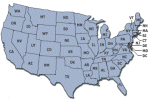International President
Secretary Treasurer
GVP Western
GVP
Canada
GVP Midwest
GVP Headquarters
GVP
Southern
GVP Eastern
GVP Transportation
|
Tuesday, April 23, 2002 The AFL-CIO and most of its affiliates plan an all-out battle to defeat the measure, which the federation says could further erode the nation’s industrial base and speed the export of U.S. jobs, capital and technology. Fast Track authority permits the President to negotiate trade deals without any congressional oversight. Once the trade deal is complete, Congress may only vote it up or down. It cannot be amended or changed in any fashion. The trade debate opens against a backdrop of withering criticism from the 15-nation European Union over stiff tariffs on imported steel imposed by President Bush. Japan, China, Switzerland, Norway and South Korea joined the EU in blasting the U.S. as a “serial abuser of trade rules.”
An EU official said
the tariff issue could wind up before the World Trade Organization,”
where the U.S. has lost several similar cases”, he said.
IAM Calls for Rail Talks Release
“It is time to move this process to the next level,” said IAM GVP Robert Roach, Jr. “The effort to reach an amicable settlement through mediation has not been successful.” Negotiations began 28 months ago to modify the agreement that became amendable January 1, 2000. The most recent negotiations took place over a month ago. If a proffer of arbitration is made by the National Mediation Board (NMB), and refused by either party, a 30-day cooling off period would begin after which the Machinists would be permitted to strike. “Notwithstanding the best efforts of the IAM, including the able input and assistance of the mediator involved, not a single issue has been resolved,” said Roach. Major issues in the negotiations include wages, job security and a NCCC demand to increase medical costs paid by members. No further negotiations are currently scheduled.
More Needs to Be Done
on Jobless Benefits In reality, most jobless workers will see much shorter extensions. Only eight states offer a guaranteed 26 weeks of benefits regardless of earnings. Other states calculate the duration based upon either the total amount of wages earned or the distribution of earnings in the qualifying year. In 35 states, jobless workers will receive less than 26 weeks of benefits, even after the extensions. About 43 percent of jobless benefit recipients exhaust their benefits in less that 26 weeks. Usually these are low-wage earners, new labor force entrants or eligible part-time workers. In five states, even a full-time, full-year minimum wage earner fails to quality for the 26 weeks.
Enron Saga Sinks
Lower Seems that at least $14 billion in assets the company listed in its bankruptcy filings are no longer there, if indeed, they ever were. In addition, the company identified “potential downward adjustments” of $8 billion to $10 billion in what it called “certain price risk management assets”. Enron officials blamed “accounting errors” for the shortfall. |





